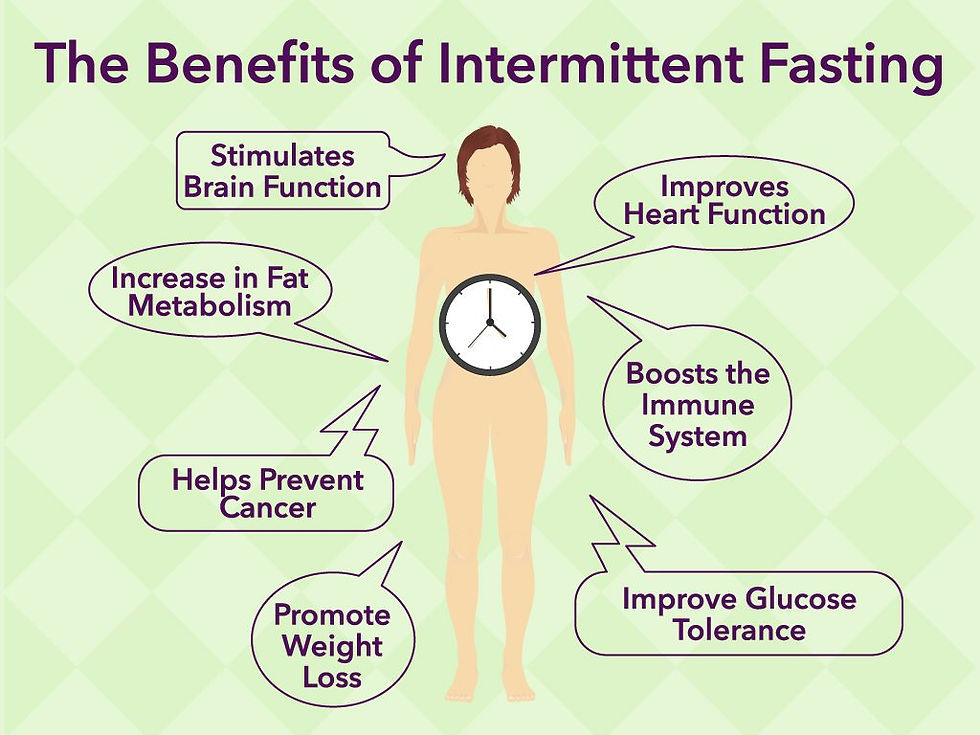What is Intermittent Fasting?
- Paola Henderson

- Oct 30, 2020
- 3 min read

If you follow me on social media you would have seen that I am doing the trendy Intermittent Fasting (IF). After studying this diet and its benefits I decided why not try it.
I began a few weeks ago fasting gradually taking up my fast from 12 hours to 14 hours to 16 hours and now I am on a 20 hour fast.
So what does Intermittent Fasting mean?
Fasting basically means not consuming any calories for a certain period of time. You are ONLY allowed to have water (unflavored or unsweetened), sparkling water, black coffee, green or black tea ( no sweeteners or creams).
What about intermittent? Intermittent means not continuous or steady, periodically or in intervals. Put these 2 terms together and what do you get?! Holding off from consuming calories for certain time intervals!
The most basic and common fasting to eating period within a day (24 hours) is 16 hours of fasting with a 8 hour eating window. Now at first this can sound intimidating, I bet you are thinking, how am I supposed to refrain from eating for 16 hours? Well, if you think about it, we all already fast without even noticing! When we sleep at night, we are fasting! Most of us sleep around 8 hours at night, so that is already half of your fasting time! This is where the term breakfast comes from, as it is the first meal in the day, we are BREAKING our FAST!
Types of Fasting

What does fasting do? Looking at fasting from a more scientific lens, it all comes down to glycogen, insulin and glucagon. When we eat, our body stores glycogen as an energy source in our livers. When fasting, these glycogen stores become depleted and our bodies have to find another source of energy. When you are in a fasted state, your insulin levels also drop. Insulin is responsible for converting glucose (which comes from sugars and carbs we consume) into fats, when your insulin levels drop, your levels of glucagon increase. Glucagon is responsible for converting FAT into GLUCOSE. So basically what all this means, is when your glycogen stores become depleted and your insulin levels drop, glucagon steps in and turns you into a FAT BURNING MACHINE! Since you are not consuming any food, our bodies use fat as its main fuel source and pulls this fat from what you already have stored in your body!
WHY FASTING? There are so many benefits to fasting!

HOW TO GET STARTED
As previously mentioned, the most common fasting to eating ratio is a 16 hour fast and a 8 hour eating period. Although you will see results quicker by fasting daily, when starting off, you can either fast for shorter periods of time within the day OR you can choose certain days in a week to fast. Be flexible, you don’t have to be super strict with yourself right away. This can help you ease into the idea of fasting, and give your body a chance to get used to it. You can start off with a 12 hour fast and work your way up to 16 hours when you are ready. During your eating window, make sure you are eating the proper foods, and are getting all your nutrients in. This will help you to stay satisfied for longer throughout your fast, and it will prevent any negative side effects such as fatigue or hunger. Remember to always listen to your body, follow whichever hour ratio works best for your body and lifestyle! As long as you are fasting for at least 12 hours, you are getting the benefits of intermittent fasting!
Get started with my 14 - Day Keto and Intermittent Fasting Program which begins November 30th, 2020




Comments